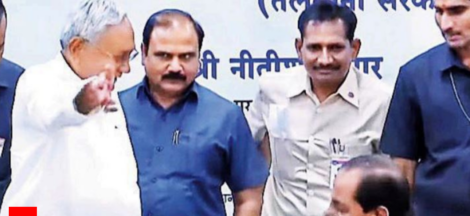By K. Raveendran
Tonnes of crocodile tears have been shed in the past one week over the murder of democracy; as though it has occurred for the first time. The truth is that democracy is being murdered in this country every day. No party has the moral right, at least none among the mainstream parties, to criticise any other party for the murder of democracy. Each one has been committing the crime with impunity and citing the precedent set by the very same party that makes the accusation. So, it is essentially a chicken and egg story.
Constitutional morality in this country is heavily skewed in favour of the party in power. And so is gubernatorial propriety, now under the scanner following the Karnataka impasse. The governor’s, or for that matter the President’s, role has an inherent bias built into the system favouring the ruling party. It takes supranatural calibre, akin to an alien from another planet, for a governor to act against the diktat of the Union Home Ministry, which for all practical purpose decides the affairs of the governors, including their appointment and longevity. If anyone has ever tried to break free, he or she would have faced the consequences. We have had very few governors with an independent mind. So, in all situations where they can exercise the power of discretion, which implies a high degree of subjectivity, the governors have been committing murder, and like a particular ‘species’ of Indians for whom up to seven murders don’t count, they have remained insulated from blame.
Karnataka governor Vajubhai Vala’s fault is that he appears to have acted blatantly in favour of the ruling party at the Centre. He has done only what other governors in the same circumstances do, but they do it with greater sophistication. Vala has additionally courted controversy by appointing a pro tem speaker, a record sheeter of sorts in his previous stint, in preference to the senior most newly-elected member, who happened to be from the Opposition. The Congress has rushed back to the Supreme Court with a request to annul the decision, but it was more in desperation rather than soundness of the demand as the Constitution does not specifically deal with the issue.
Speaker’s is an institution that is uniquely positioned to commit murder in Jagjit Singh-style ‘ahista’. No other constitutional institution has been abused so much in this country as the speaker’s. They are supposed to safeguard the rights and privileges of the House as a whole, but end up protecting the government. With morality becoming one of the biggest casualties of the current generation of politicians – nay Indians – it is most unreasonable to expect anyone occupying the speaker’s chair to behave like a true custodian of the House. Examples are dime a dozen.
The venerated old Statesman newspaper used to refer to Balram Jhakar in its editorials as the Congress speaker. And he wouldn’t have minded it either, for, such was his conduct. Jhakar was the Lok Sabha Speaker during Indira Gandhi’s come-back regime and the Rajiv Gandhi government from 1980 to 1989 and his rulings were considered to be most partisan and favouring the ruling party, throwing all other considerations to wind. But people who occupied his place subsequently have outdone him in the task.
In a way, we cannot blame the Speakers for what they do, because there is a fault in the system. Speakers are political beings, like any other member of the House, and belong to a party, whose interest they have to safeguard as they to go back to the party at the end of their tenure. They have to take care of their future in the party, which automatically creates a conflict of interest with their responsibilities as a Speaker. So in the type of parliamentary practice that we follow, it is both technically and practically not possible for any Speaker to perform in a bipartisan manner, unless one is totally committed to upholding democratic principles at great personal risk.
With an ever-growing deficit in morality and values, which is outpacing even the country’s budget deficit, we desperately need to reform our institutions to retrieve them from decay. Although they continue to be highly desirable, the principles that guided the creation of these institutions are no longer respected and followed, which has created an existential crisis for our institutions. This has affected every democratic institution.
Until some time ago, the people of this country could never imagine the kind of developments that a hallowed institution such as the Supreme Court has witnessed: judges coming out in the open and placing issues of compromised judicial integrity in the conduct of business by the apex court before people’s court, the judges getting divided into two camps, and more dangerously their judgments betraying their known dispositions and a whole gamut of issues concerning judicial independence. Matters have come to such a pass that one can even predict how they are going to play out in the end.
Despite all our tall claims, including the ill-conceived comparison to the Pakistani institutions, democracy in India has been dead for long: murdered and mutilated. Long live democracy! (IPA Service)
The post Democracy is dead; long live democracy! appeared first on Newspack by India Press Agency.


